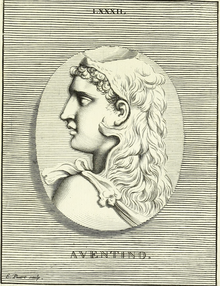Aventinus (mythology)

Aventinus was a son of Hercules and the priestess Rhea mentioned in Virgil's Aeneid, Book vii. 656, as an ally of Mezentius and enemy of Aeneas (Dryden's translation):
Next Aventinus drives his chariot round
TheJove
The priestess Rhea found, and forc'd to love.
For arms, his men long piles and jav'lins bore;
And poles with pointed steel their foes in battle gore.
Like Hercules himself his son appears,
In salvage pomp; a lion's hide he wears;
About his shoulders hangs the shaggy skin;
The teeth and gaping jaws severely grin.
Thus, like the god his father, homely dress'd,
He strides into the hall, a horrid guest.
Aventinus
:
- "The Aventine is a hill in the city of Rome. It is accepted that it derives its name from birds (aves) which, rising from the Tiber, nested there (as we read in the eighth book of a suitable home for the nests of ill-omened birds). This is because of a king of the Aboriginal Italians, Aventinus by name, who were both killed and buried there - just as the Alban king Aventinus was, he was succeeded by Procas. Varro, however, states that amongst the Roman people, the Sabines accepted this mountain when it was offered to them by Romulus, and called it the Aventine after the Aventus river in its area. It is therefore accepted that these different opinions came later, for in the beginning it was called Aventinus after either the birds or the Aboriginal King: from which it is accepted that the son of Hercules mentioned here took his name from that of the hill, not vice versa."[1]
This Aventinus (the son of Hercules) is not mentioned elsewhere in classical literature.
